The Social and Moral Context of Healthcare: Justifying Ethical Actions
VerifiedAdded on 2023/06/11
|5
|1476
|152
Essay
AI Summary
This essay delves into the intricate social and moral context of healthcare, particularly focusing on the ethical dilemmas faced by healthcare professionals. It examines a scenario involving a patient with a poor prognosis and the family's request to withhold information, analyzing the situation through the lens of four key ethical principles: autonomy, beneficence, non-maleficence, and justice. The essay discusses how nurses navigate these principles to justify their actions, highlighting the conflicts that can arise between them, particularly between autonomy and beneficence. Ultimately, it concludes that there is no perfect solution to ethical dilemmas, emphasizing the importance of considering the American Nurses Association code of ethics, patient rights, and a thorough evaluation of potential risks and benefits to arrive at the most appropriate decision. Desklib offers a variety of resources including past papers and solved assignments to aid students in understanding complex topics like healthcare ethics.
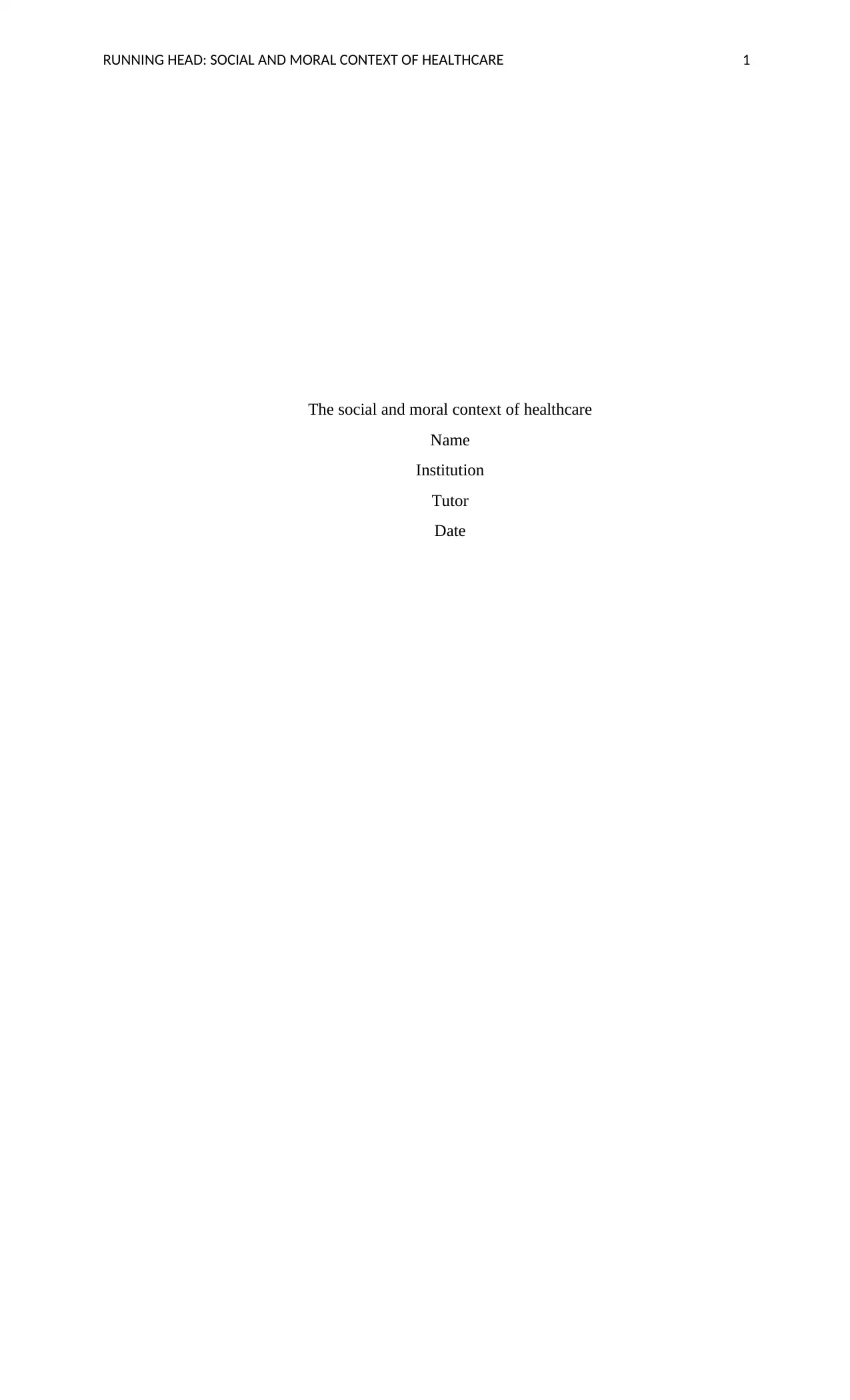
RUNNING HEAD: SOCIAL AND MORAL CONTEXT OF HEALTHCARE 1
The social and moral context of healthcare
Name
Institution
Tutor
Date
The social and moral context of healthcare
Name
Institution
Tutor
Date
Paraphrase This Document
Need a fresh take? Get an instant paraphrase of this document with our AI Paraphraser
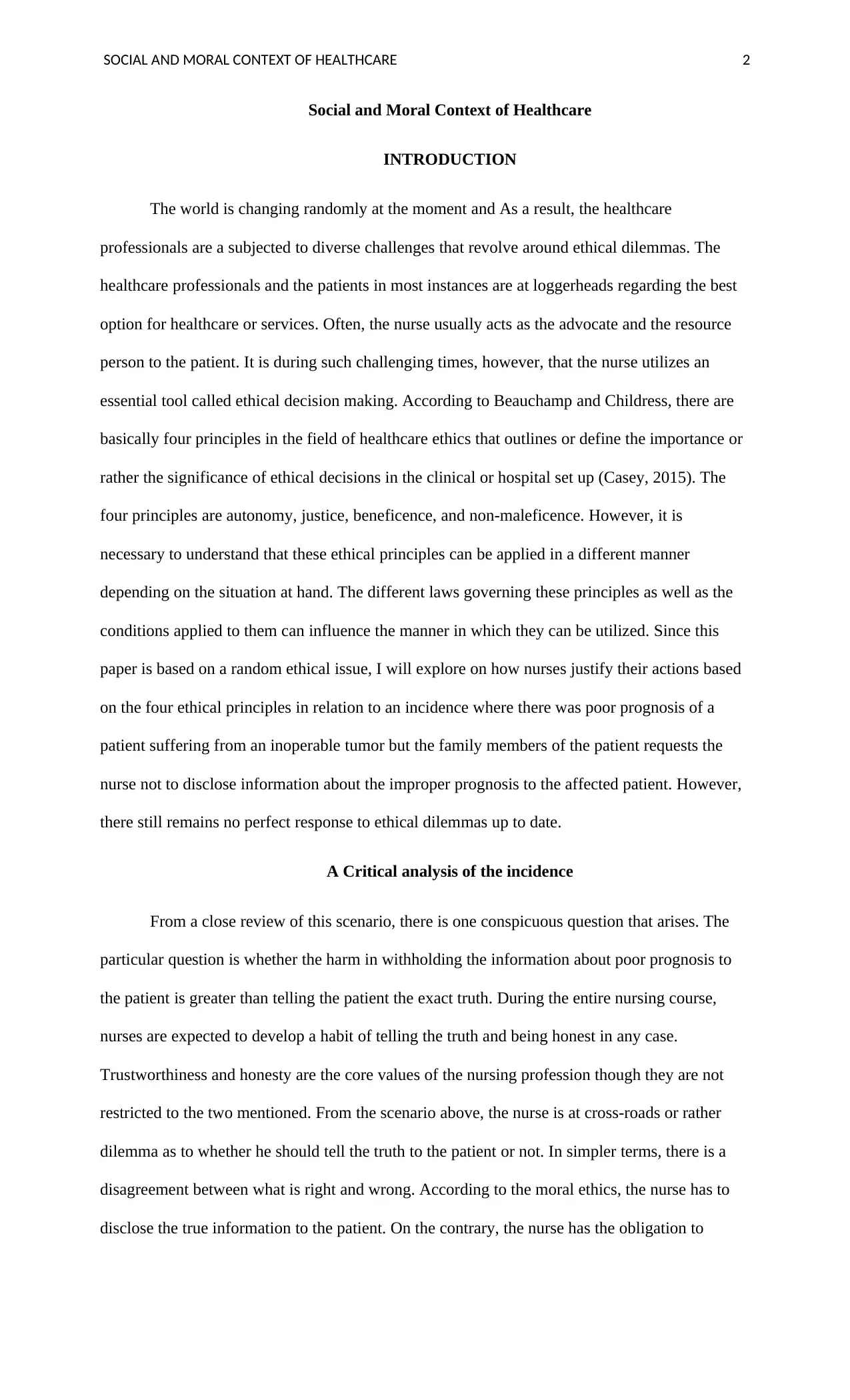
SOCIAL AND MORAL CONTEXT OF HEALTHCARE 2
Social and Moral Context of Healthcare
INTRODUCTION
The world is changing randomly at the moment and As a result, the healthcare
professionals are a subjected to diverse challenges that revolve around ethical dilemmas. The
healthcare professionals and the patients in most instances are at loggerheads regarding the best
option for healthcare or services. Often, the nurse usually acts as the advocate and the resource
person to the patient. It is during such challenging times, however, that the nurse utilizes an
essential tool called ethical decision making. According to Beauchamp and Childress, there are
basically four principles in the field of healthcare ethics that outlines or define the importance or
rather the significance of ethical decisions in the clinical or hospital set up (Casey, 2015). The
four principles are autonomy, justice, beneficence, and non-maleficence. However, it is
necessary to understand that these ethical principles can be applied in a different manner
depending on the situation at hand. The different laws governing these principles as well as the
conditions applied to them can influence the manner in which they can be utilized. Since this
paper is based on a random ethical issue, I will explore on how nurses justify their actions based
on the four ethical principles in relation to an incidence where there was poor prognosis of a
patient suffering from an inoperable tumor but the family members of the patient requests the
nurse not to disclose information about the improper prognosis to the affected patient. However,
there still remains no perfect response to ethical dilemmas up to date.
A Critical analysis of the incidence
From a close review of this scenario, there is one conspicuous question that arises. The
particular question is whether the harm in withholding the information about poor prognosis to
the patient is greater than telling the patient the exact truth. During the entire nursing course,
nurses are expected to develop a habit of telling the truth and being honest in any case.
Trustworthiness and honesty are the core values of the nursing profession though they are not
restricted to the two mentioned. From the scenario above, the nurse is at cross-roads or rather
dilemma as to whether he should tell the truth to the patient or not. In simpler terms, there is a
disagreement between what is right and wrong. According to the moral ethics, the nurse has to
disclose the true information to the patient. On the contrary, the nurse has the obligation to
Social and Moral Context of Healthcare
INTRODUCTION
The world is changing randomly at the moment and As a result, the healthcare
professionals are a subjected to diverse challenges that revolve around ethical dilemmas. The
healthcare professionals and the patients in most instances are at loggerheads regarding the best
option for healthcare or services. Often, the nurse usually acts as the advocate and the resource
person to the patient. It is during such challenging times, however, that the nurse utilizes an
essential tool called ethical decision making. According to Beauchamp and Childress, there are
basically four principles in the field of healthcare ethics that outlines or define the importance or
rather the significance of ethical decisions in the clinical or hospital set up (Casey, 2015). The
four principles are autonomy, justice, beneficence, and non-maleficence. However, it is
necessary to understand that these ethical principles can be applied in a different manner
depending on the situation at hand. The different laws governing these principles as well as the
conditions applied to them can influence the manner in which they can be utilized. Since this
paper is based on a random ethical issue, I will explore on how nurses justify their actions based
on the four ethical principles in relation to an incidence where there was poor prognosis of a
patient suffering from an inoperable tumor but the family members of the patient requests the
nurse not to disclose information about the improper prognosis to the affected patient. However,
there still remains no perfect response to ethical dilemmas up to date.
A Critical analysis of the incidence
From a close review of this scenario, there is one conspicuous question that arises. The
particular question is whether the harm in withholding the information about poor prognosis to
the patient is greater than telling the patient the exact truth. During the entire nursing course,
nurses are expected to develop a habit of telling the truth and being honest in any case.
Trustworthiness and honesty are the core values of the nursing profession though they are not
restricted to the two mentioned. From the scenario above, the nurse is at cross-roads or rather
dilemma as to whether he should tell the truth to the patient or not. In simpler terms, there is a
disagreement between what is right and wrong. According to the moral ethics, the nurse has to
disclose the true information to the patient. On the contrary, the nurse has the obligation to
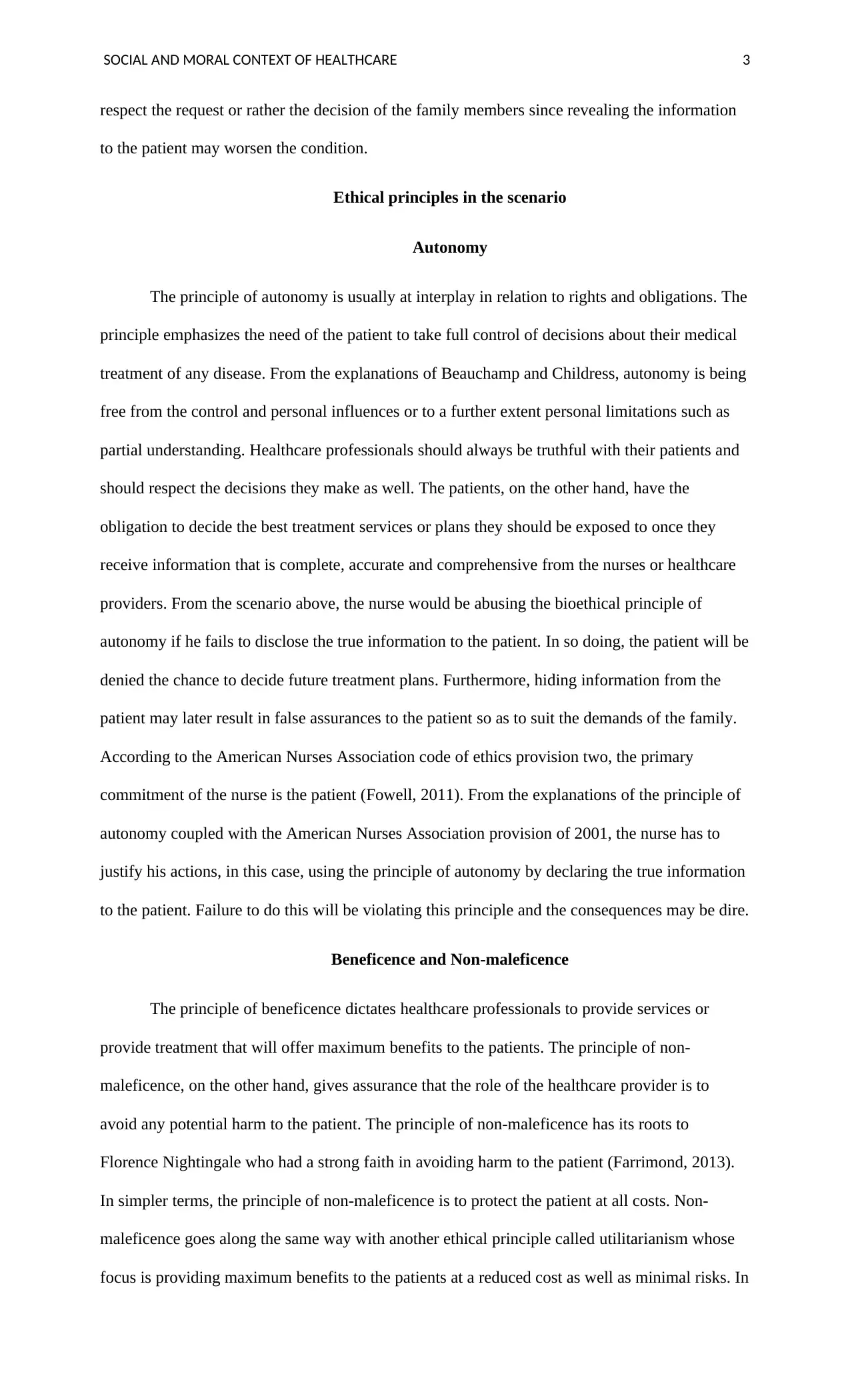
SOCIAL AND MORAL CONTEXT OF HEALTHCARE 3
respect the request or rather the decision of the family members since revealing the information
to the patient may worsen the condition.
Ethical principles in the scenario
Autonomy
The principle of autonomy is usually at interplay in relation to rights and obligations. The
principle emphasizes the need of the patient to take full control of decisions about their medical
treatment of any disease. From the explanations of Beauchamp and Childress, autonomy is being
free from the control and personal influences or to a further extent personal limitations such as
partial understanding. Healthcare professionals should always be truthful with their patients and
should respect the decisions they make as well. The patients, on the other hand, have the
obligation to decide the best treatment services or plans they should be exposed to once they
receive information that is complete, accurate and comprehensive from the nurses or healthcare
providers. From the scenario above, the nurse would be abusing the bioethical principle of
autonomy if he fails to disclose the true information to the patient. In so doing, the patient will be
denied the chance to decide future treatment plans. Furthermore, hiding information from the
patient may later result in false assurances to the patient so as to suit the demands of the family.
According to the American Nurses Association code of ethics provision two, the primary
commitment of the nurse is the patient (Fowell, 2011). From the explanations of the principle of
autonomy coupled with the American Nurses Association provision of 2001, the nurse has to
justify his actions, in this case, using the principle of autonomy by declaring the true information
to the patient. Failure to do this will be violating this principle and the consequences may be dire.
Beneficence and Non-maleficence
The principle of beneficence dictates healthcare professionals to provide services or
provide treatment that will offer maximum benefits to the patients. The principle of non-
maleficence, on the other hand, gives assurance that the role of the healthcare provider is to
avoid any potential harm to the patient. The principle of non-maleficence has its roots to
Florence Nightingale who had a strong faith in avoiding harm to the patient (Farrimond, 2013).
In simpler terms, the principle of non-maleficence is to protect the patient at all costs. Non-
maleficence goes along the same way with another ethical principle called utilitarianism whose
focus is providing maximum benefits to the patients at a reduced cost as well as minimal risks. In
respect the request or rather the decision of the family members since revealing the information
to the patient may worsen the condition.
Ethical principles in the scenario
Autonomy
The principle of autonomy is usually at interplay in relation to rights and obligations. The
principle emphasizes the need of the patient to take full control of decisions about their medical
treatment of any disease. From the explanations of Beauchamp and Childress, autonomy is being
free from the control and personal influences or to a further extent personal limitations such as
partial understanding. Healthcare professionals should always be truthful with their patients and
should respect the decisions they make as well. The patients, on the other hand, have the
obligation to decide the best treatment services or plans they should be exposed to once they
receive information that is complete, accurate and comprehensive from the nurses or healthcare
providers. From the scenario above, the nurse would be abusing the bioethical principle of
autonomy if he fails to disclose the true information to the patient. In so doing, the patient will be
denied the chance to decide future treatment plans. Furthermore, hiding information from the
patient may later result in false assurances to the patient so as to suit the demands of the family.
According to the American Nurses Association code of ethics provision two, the primary
commitment of the nurse is the patient (Fowell, 2011). From the explanations of the principle of
autonomy coupled with the American Nurses Association provision of 2001, the nurse has to
justify his actions, in this case, using the principle of autonomy by declaring the true information
to the patient. Failure to do this will be violating this principle and the consequences may be dire.
Beneficence and Non-maleficence
The principle of beneficence dictates healthcare professionals to provide services or
provide treatment that will offer maximum benefits to the patients. The principle of non-
maleficence, on the other hand, gives assurance that the role of the healthcare provider is to
avoid any potential harm to the patient. The principle of non-maleficence has its roots to
Florence Nightingale who had a strong faith in avoiding harm to the patient (Farrimond, 2013).
In simpler terms, the principle of non-maleficence is to protect the patient at all costs. Non-
maleficence goes along the same way with another ethical principle called utilitarianism whose
focus is providing maximum benefits to the patients at a reduced cost as well as minimal risks. In
⊘ This is a preview!⊘
Do you want full access?
Subscribe today to unlock all pages.

Trusted by 1+ million students worldwide
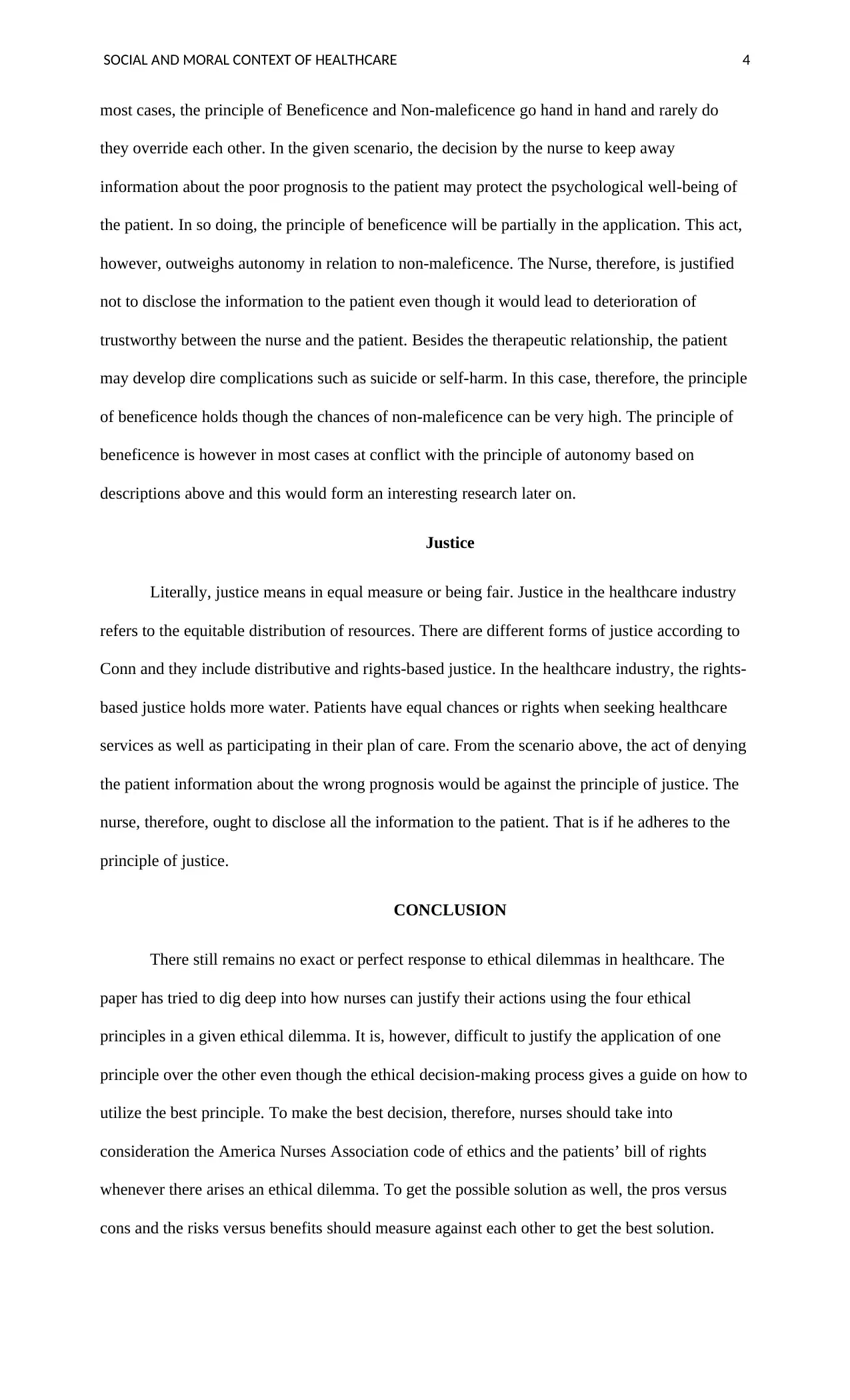
SOCIAL AND MORAL CONTEXT OF HEALTHCARE 4
most cases, the principle of Beneficence and Non-maleficence go hand in hand and rarely do
they override each other. In the given scenario, the decision by the nurse to keep away
information about the poor prognosis to the patient may protect the psychological well-being of
the patient. In so doing, the principle of beneficence will be partially in the application. This act,
however, outweighs autonomy in relation to non-maleficence. The Nurse, therefore, is justified
not to disclose the information to the patient even though it would lead to deterioration of
trustworthy between the nurse and the patient. Besides the therapeutic relationship, the patient
may develop dire complications such as suicide or self-harm. In this case, therefore, the principle
of beneficence holds though the chances of non-maleficence can be very high. The principle of
beneficence is however in most cases at conflict with the principle of autonomy based on
descriptions above and this would form an interesting research later on.
Justice
Literally, justice means in equal measure or being fair. Justice in the healthcare industry
refers to the equitable distribution of resources. There are different forms of justice according to
Conn and they include distributive and rights-based justice. In the healthcare industry, the rights-
based justice holds more water. Patients have equal chances or rights when seeking healthcare
services as well as participating in their plan of care. From the scenario above, the act of denying
the patient information about the wrong prognosis would be against the principle of justice. The
nurse, therefore, ought to disclose all the information to the patient. That is if he adheres to the
principle of justice.
CONCLUSION
There still remains no exact or perfect response to ethical dilemmas in healthcare. The
paper has tried to dig deep into how nurses can justify their actions using the four ethical
principles in a given ethical dilemma. It is, however, difficult to justify the application of one
principle over the other even though the ethical decision-making process gives a guide on how to
utilize the best principle. To make the best decision, therefore, nurses should take into
consideration the America Nurses Association code of ethics and the patients’ bill of rights
whenever there arises an ethical dilemma. To get the possible solution as well, the pros versus
cons and the risks versus benefits should measure against each other to get the best solution.
most cases, the principle of Beneficence and Non-maleficence go hand in hand and rarely do
they override each other. In the given scenario, the decision by the nurse to keep away
information about the poor prognosis to the patient may protect the psychological well-being of
the patient. In so doing, the principle of beneficence will be partially in the application. This act,
however, outweighs autonomy in relation to non-maleficence. The Nurse, therefore, is justified
not to disclose the information to the patient even though it would lead to deterioration of
trustworthy between the nurse and the patient. Besides the therapeutic relationship, the patient
may develop dire complications such as suicide or self-harm. In this case, therefore, the principle
of beneficence holds though the chances of non-maleficence can be very high. The principle of
beneficence is however in most cases at conflict with the principle of autonomy based on
descriptions above and this would form an interesting research later on.
Justice
Literally, justice means in equal measure or being fair. Justice in the healthcare industry
refers to the equitable distribution of resources. There are different forms of justice according to
Conn and they include distributive and rights-based justice. In the healthcare industry, the rights-
based justice holds more water. Patients have equal chances or rights when seeking healthcare
services as well as participating in their plan of care. From the scenario above, the act of denying
the patient information about the wrong prognosis would be against the principle of justice. The
nurse, therefore, ought to disclose all the information to the patient. That is if he adheres to the
principle of justice.
CONCLUSION
There still remains no exact or perfect response to ethical dilemmas in healthcare. The
paper has tried to dig deep into how nurses can justify their actions using the four ethical
principles in a given ethical dilemma. It is, however, difficult to justify the application of one
principle over the other even though the ethical decision-making process gives a guide on how to
utilize the best principle. To make the best decision, therefore, nurses should take into
consideration the America Nurses Association code of ethics and the patients’ bill of rights
whenever there arises an ethical dilemma. To get the possible solution as well, the pros versus
cons and the risks versus benefits should measure against each other to get the best solution.
Paraphrase This Document
Need a fresh take? Get an instant paraphrase of this document with our AI Paraphraser
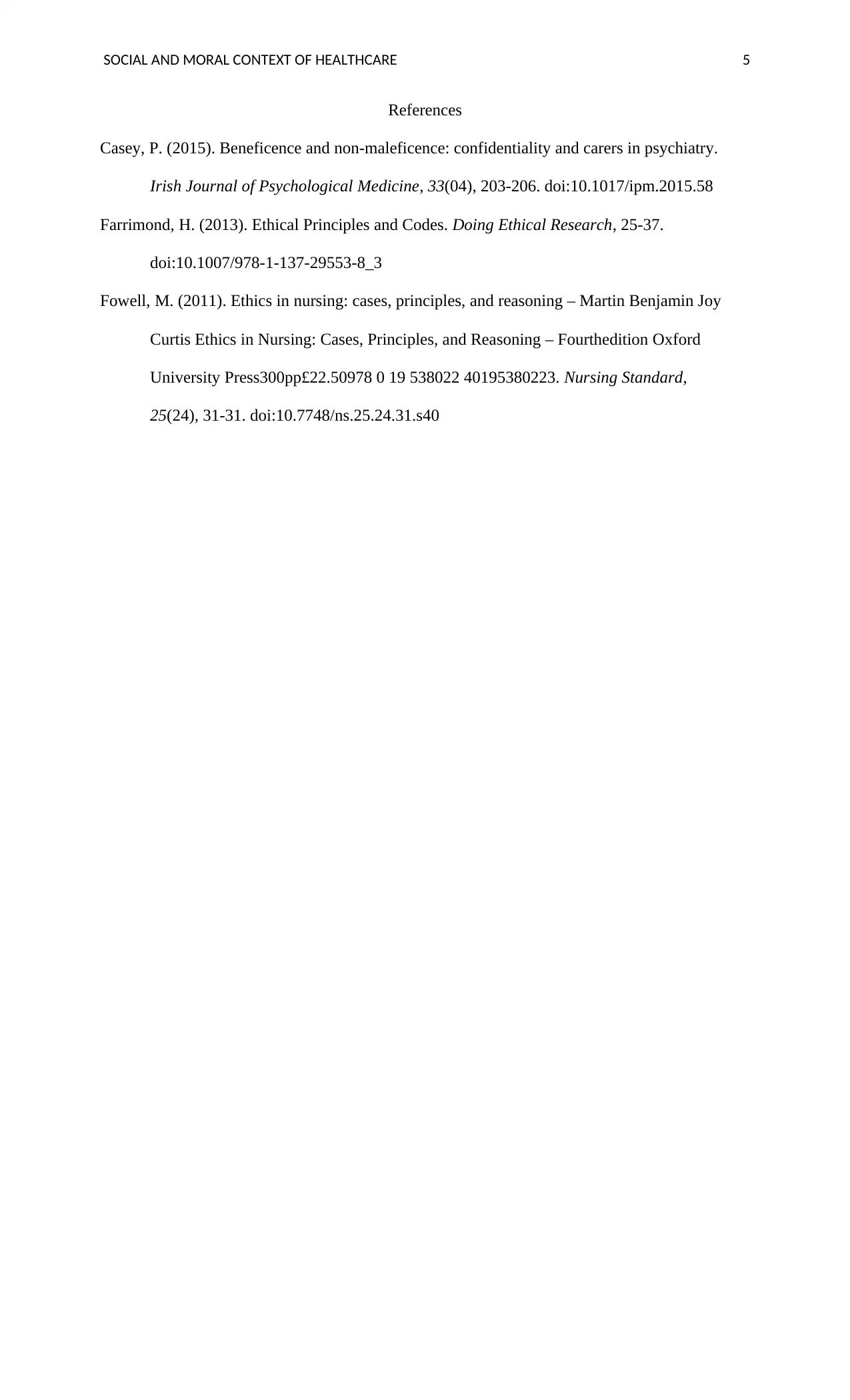
SOCIAL AND MORAL CONTEXT OF HEALTHCARE 5
References
Casey, P. (2015). Beneficence and non-maleficence: confidentiality and carers in psychiatry.
Irish Journal of Psychological Medicine, 33(04), 203-206. doi:10.1017/ipm.2015.58
Farrimond, H. (2013). Ethical Principles and Codes. Doing Ethical Research, 25-37.
doi:10.1007/978-1-137-29553-8_3
Fowell, M. (2011). Ethics in nursing: cases, principles, and reasoning – Martin Benjamin Joy
Curtis Ethics in Nursing: Cases, Principles, and Reasoning – Fourthedition Oxford
University Press300pp£22.50978 0 19 538022 40195380223. Nursing Standard,
25(24), 31-31. doi:10.7748/ns.25.24.31.s40
References
Casey, P. (2015). Beneficence and non-maleficence: confidentiality and carers in psychiatry.
Irish Journal of Psychological Medicine, 33(04), 203-206. doi:10.1017/ipm.2015.58
Farrimond, H. (2013). Ethical Principles and Codes. Doing Ethical Research, 25-37.
doi:10.1007/978-1-137-29553-8_3
Fowell, M. (2011). Ethics in nursing: cases, principles, and reasoning – Martin Benjamin Joy
Curtis Ethics in Nursing: Cases, Principles, and Reasoning – Fourthedition Oxford
University Press300pp£22.50978 0 19 538022 40195380223. Nursing Standard,
25(24), 31-31. doi:10.7748/ns.25.24.31.s40
1 out of 5
Related Documents
Your All-in-One AI-Powered Toolkit for Academic Success.
+13062052269
info@desklib.com
Available 24*7 on WhatsApp / Email
![[object Object]](/_next/static/media/star-bottom.7253800d.svg)
Unlock your academic potential
Copyright © 2020–2026 A2Z Services. All Rights Reserved. Developed and managed by ZUCOL.




